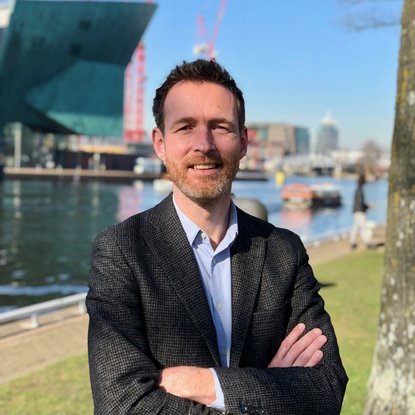After six years of research by the Massachusetts Institute of Technology (MIT) and Amsterdam Institute for Advanced Metropolitan Solutions (AMS Institute), Roboat has officially launched independently. The project, which focused on developing autonomous navigation technology for boats for urban and inland waterways, has now transitioned into a spin-off company that will scale up the technology to waterways worldwide. With the launch of the Roboat spin-off company, we will soon see new and old boats becoming "smart" with the help of Roboat’s autonomous navigation technology.
With 165 canals winding alongside busy city streets, about a quarter of Amsterdam’s surface area is water. Initiated by AMS Institute and MIT in 2015, Roboat introduced the world to a revolutionary concept in mobility: autonomous boats for the urban environment. An idea that was born to alleviate pressure from Amsterdam’s busy city center roads and re-vitalize the Amsterdam canals. Since then, the concept of autonomy on the urban waterways has grown into a worldwide opportunity to revolutionize mobility in cities that have extensive waterway networks like most larger delta-based cities.
“Whereas most autonomous shipping focuses on more straightforward trajectories, Roboat technology is designed to navigate dynamic and complex urban and inland waterways, such as the Amsterdam canals, which makes Roboat technology relevant for cities and harbor areas worldwide. Combined with its ability to perform its tasks 24/7, Roboat technology can add great value to safer and more sustainable transport on the water in the city”
Stephan van Dijk
Director of Innovation
A wealth of scientific knowledge
Through extensive research, visualizations, experiments, and prototypes, the concept of Roboat was gradually brought to life since its inception in 2015. The research was carried out by MIT scientists together with Amsterdam Institute for Advanced Metropolitan Solutions (AMS Institute). The project team held a demonstration event each year to showcase its latest achievements. Over time, cutting-edge results from the research have been publicly published in over 18 scientific articles. Roboat generated a wealth of scientific knowledge on autonomous navigation, perception- and control systems. But also on use cases where Roboats could be deployed as an alternative mode of urban transportation. But Roboat went beyond academic findings as it represents a significant opportunity for urban mobility and transportation challenges in 21st-century cities, which led to collaborations with industry partners and interest from other cities as well.
“We are excited to take the next step in bringing this technology to the market. Our innovative approach has the potential to make a significant impact in the field of autonomous shipping and waterborne transport and we are happy to begin this new chapter as a start-up. We want to thank MIT and AMS Institute for taking the initiative and providing fertile ground for Roboat. and all our partners and supporters, including Gemeente Amsterdam, for their invaluable contributions during this remarkable journey”
Ynse Deinema, project leader at AMS Institute and CEO of the Roboat company.

New horizons
In 2021, Roboat technology reached the full-scale prototype stage. The team built one water taxi and one waste collection boat, which have been used to demonstrate full autonomy on the water. During all those years, Roboat’s vision to change cities for the better hasn’t changed. An entrepreneurial team of four engineers and software developers, led by the former project leader at AMS Institute, will start the company and is committed to fulfilling the potential for autonomous boats to tackle urban transportation challenges in Amsterdam and abroad. The first commercial projects and products will launch soon. For more information, please visit www.roboat.tech.
“Roboat is not about making ships autonomous, but it is about reinventing mobility on the water. The applications are potentially limitless. From waste collection to supporting quay restorations, but in the end it makes mobility on the water safer, flexible and efficient.”
Ger Baron, Director Digital and Innovation, City of Amsterdam

“After 6 years of academic research, we are thrilled to see Roboat sailing on its own as a new company - and contributing to change and expand the way we think about urban mobility.”
Carlo Ratti
Professor at MIT Senseable City Lab & AMS PI
Roboat was a research project of MIT and AMS Institute, supported by the City of Amsterdam.
The founder’s team consists of Ynse Deinema, Rens Doornbusch, Joshua Jordan and Jonathan Klein Schiphorst.
AMS Institute is founded by Delft University of Technology, Wageningen University & Research, and Massachusetts Institute of Technology – in close collaboration with the city of Amsterdam.


